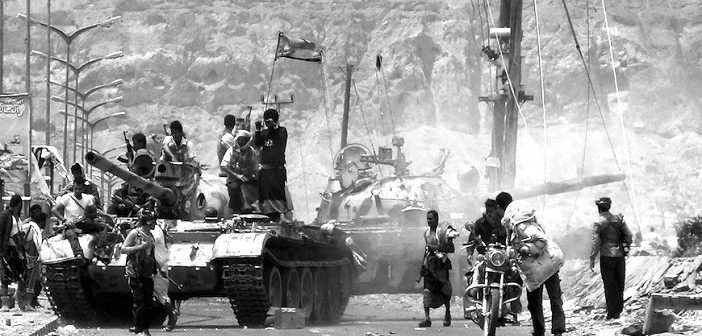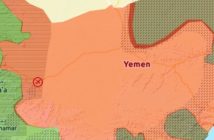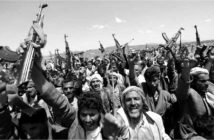Geneva’s failure, not only for Syria…
It was not a surprise that the Geneva 2 Yemeni peace talks failed to make any progress –they even did not help to restrain the scale of military and political engagement, nor to honor the stated truce by President Abd Rabo Mansour Hadi and the coalition troops.
The Saleh-Houthi alliance went to Geneva while their militias were capable enough to hinder the momentum of the offensivelaunched by the troops loyal to President Hadi and backed by coalition forces and local resistance fighters to recapture Taiz. In the run-up to Geneva hundreds of Houthis militants also tried to make an incursion into Saudi territories on the borders. Yet the Houthi-Saleh camp has suffered a grave setback since their militants have largely been pushed out of the two governorates of Marib and Al-Jawf.
However, the Houthi-Saleh negotiator team was in a relatively comfortable position.
Meanwhile, Hadi’s troops and popular resistance fighters backed by Saudi-led coalition troops have recently managed to make significant advancements in Marib and Al-Jawf so that they have come quite close to the capital Sana’a – some troops and tribal fighters are reported to have arrived in the Nihim district of the Sana’a governorate.
One significant concession has been made by the Houthi-Saleh camp: they agreed to participate in the Geneva 2 talks, as a negotiation between two parties; one is a representative of the official legitimacy, the other stands for the rebels. This is unlike Geneva 1, which was a negotiation between political factions.
The credit goes to the UN envoy, Mr. Ismail Weld Al-Sheikh Ahmed, who could bring the two sides to sit-down together, face to face, at one single negotiating table. Nonetheless, expectations were low about the potential outcomes.
It was clear that Hadi’s government team had to be attending due to the diplomatic pressure. The internationally recognized government wanted to neutralize the international community position that the UN stands for. As changes on the ground over recent months since Geneva1 have caused the Houthi-Saleh team to understand that such developments make it very difficult for them to realize the minimum of their conditions for a political settlement that can secure them the minimum portion of power to be capable of attaining their crucial objectives and necessary interests.
As Geneva 2 was merely a public relations venue where messages were intended to be transmitted by the different parties, even though the announcement of a third round of talks was described as a progress, such nominal success has been diminished once Saleh declared he would not go to any upcoming negotiations except once the war would be totally ended. Moreover, he said that he would only go to negotiate with the Saudis directly and not their collaborators, namely Hadi’s government. Al-Houthi also declared that he would go on fighting until the end.
Though Hadi’s government has been largely reshuffled, it is still dysfunctional concerning managerial and security duties, seriously challenged by insecurity, terrorist operative groups and lawlessness. Yet it has come to a better position due to the retreat of the Houthi-Saleh alliance influence and their inability to carry out any serious counter-attack, or to recapture any region they have been forcefully pushed out of.
The fact is that Hadi’s camp has already managed to make significant advancements in the two provinces of Marib and Al-Jawf. The two governorates are of paramount significance, strategically and tribally. Although Al-Jawf has the least population, it is the heartland of the northern tribal region and the origin of one of the largest Yemeni tribes, the Bakil. The city of Al-Hazem which is the central city of Al-Jawf has already come under the control of Hadi government troops and loyal tribes. This is a symbolic progress for Hadi’s bloc and it is very likely to prompt major changes of the influence on tribal positions and loyalties. Such changes will play a key role in the nature of the upcoming conflicts, particularly as the war has been approaching these tribal areas.
Another point to be highlighted here is the disputes within Hadi’s camp. The cabinet reshuffle Hadihas recently made on Bahah’s government has partly insinuated a sort of strife between the two men. Bahah’s reaction to the cabinet reshuffle indicated that he was not consulted about it. This strife embodies different attitudes about the political and military process, but it also bears the interests of different regional powerswithin the Saudi-led coalition member states that side with the two leaders.
It is not a secret that the coalition member states have different visions on the possible options to get the conflict solved; they also have conflicting interests even though Saudi-Arabia has been capable to manage the differences so far.
The changes Hadi made on the government line-up has illustrated changes in the roles of the political forces which make up the governmental alliance. Under the cabinet reshuffle, a northern politician with a Nassirate background assumed the foreign ministry portfolio, and Hadi’s allies from Abyan have been assigned to significant ministries including the interior ministry.
However, most important change lies in Hadi’s decision to engage leading figures of the southern movement—particularly from the two governorates of Al-Dalae and Luhj, which used to be the constituencies of Hadi’s opponents in the previous internal conflicts, prior to the country re-unification.
Bringing battles into the heartland of the rebels such as Sa’ada and Hajja governorates will mark significant change in the balance of powers and the battles on the ground. Battles have already commenced in Hajja where the government troops backed by the coalition forces have managed to drive the Houthi militants out of the sea port city of Mede, on the Red Sea. This is a very important advancement in the rebel stronghold region.
Fighting a new frontline battle in the north is very important to mount pressure on the rebels, and to get their military capacity overstretched. Consequentially, this would reduce pressure on other frontlines, such as Taiz, where people have been facing an unbearable humanitarian crisis.
The balance of power on the ground, the regional and international stances (thus the conflicting interests of the ten-country coalition led by Saudi Arabia), as well as the position of some national factions like the Al-Islah party (Muslim Brotherhood), all suggest that the conflict is set to be protracted for a long time. Meanwhile, the security situation and living conditions are increasingly deteriorating, whereas the prospects of political settlement are more feeble now than ever.
Nonetheless some analysts and observers argue that inflicting grave losses on the Saleh-Houthi forces will cause them to seek for a compromise to help them maintain the remaining portion of their resources and capacities.
Yemen’s contemporary history tells us that internal conflicts, even those, which broke out occasionally, usually continued for years…




